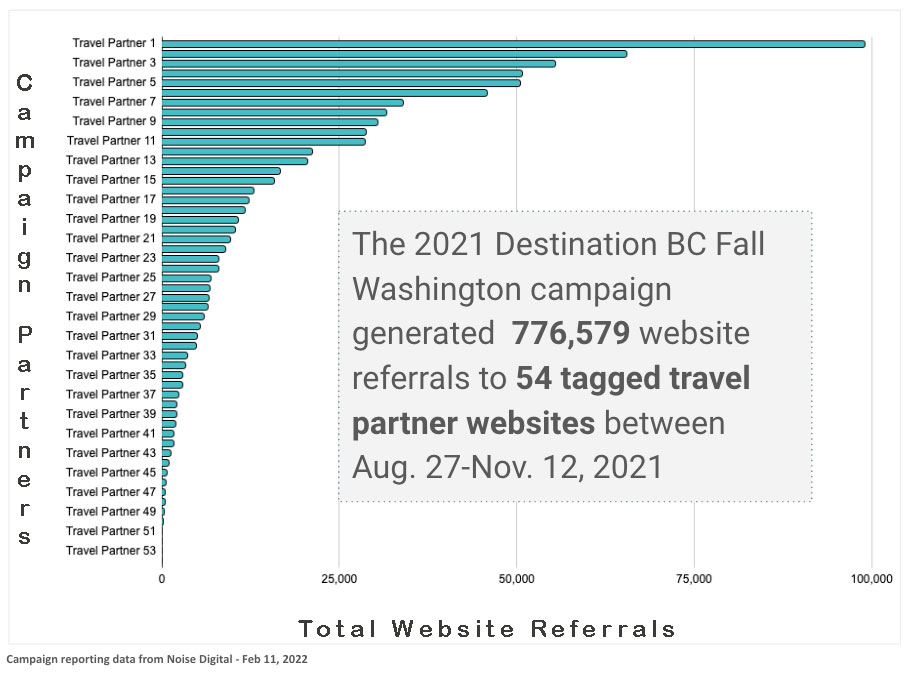
Northern British Columbia | Megan McLellan
Drive More Leads to Your Website – Let’s Play “Tag”!
According to the Economist, data has replaced oil as the world’s most valuable resource. Fueled by digital technology, the sheer abundance of data that is collected, analyzed and used can drive transformation and growth in any industry. How is tourism, and your tourism business, benefitting?
Let’s explore one way in which your tourism business can track data: website tagging.
Any BC tourism business website is eligible to join the tagging program. This will help Destination BC increase marketing efficiencies, through increased performance measurement, in an effort to drive more leads to travel partners.

As part of the 2021 Fall Washington Campaign, partner CDMOs proposed tagging candidate businesses, to track all referral visits generated from the campaign.
The 2021 Destination BC Fall Washington campaign generated 776,579 website referrals to 54 tagged travel partner websites between Aug. 27-Nov. 12, 2021 (as shown by the graph above).
Website Tagging
A tag (also called a pixel, floodlight tag, or beacon) is a piece of code inserted in a website HTML that collects data. When a web page that contains a tag is loaded, the tag is activated and the data it was designed to collect is captured and transmitted to an application, such as an analytics tool.
Tags collect data that can inform better decision making and help you understand what content and channels are most effective in converting a lead into a sale. For example, tags can collect:
- Information on products, content, or ads that a user viewed, links clicked or time on page
- Conversions (if a user books or buys)
- Anonymous data, such as a Profile ID or targeting criteria
- Tags do not collect personal information such as name or address
- Tags only collect revenue information if that setting is activated
Why are Tags Important?
In digital marketing, tags allow you to track metrics beyond impressions and click-through rates. Web page personalization, testing and optimization of digital marketing activities, automation, audience insights and other analytics are all enabled through tagging. Importantly, some tags allow you to see conversions and bookings attributed to specific digital marketing activities that you undertake.
How can you manage tags on your website?
While tags on your website can provide you with robust data, too many tags can slow your website down. Luckily, there are a number of programs that can help you manage your tags, often without having to bring in a website developer.
Tag management platforms, such as Google Tag Manager (GTM), allow you to connect, manage and remove tags used throughout your business website. With GTM, there is usually a way to copy the code in one place and the GTM will propagate it on all the other pages. If you run digital marketing campaigns – such as display, search, social or email – then you would benefit from using a tag management platform.
Getting Started With Tagging
Tagging may seem like a daunting subject, but with a little knowledge and assistance, it can be done quickly and effectively to help generate insights into visiting audiences.
Destination BC works with tourism businesses across the province to help drive more leads to their websites. By placing analytic tags on your website, tourism business partners can help improve Destination BC’s marketing efforts through increased customer journey data.
Participation is fast and easy!
- Click here to contact our team to let us know you’re interested in participating
- We will generate tags specific to your business and send them to you via email.
- Either you or your web developer can implement the tag OR
- Click here to book an appointment for Destination BC to implement the tags for you
- Time involved: ~15 – 60 minutes
- Benefit: potential increase in website referrals and conversions, together with leveraging the reach and exposure of DBC’s marketing campaigns
Tagging Testimonials
“Capturing and evaluating data in today’s digital marketing space is key to maximizing campaign successes. Setting up the website tags to assist DBC and Destination Vancouver in tracking and evaluating their fall marketing campaign into WA state was fast & simple. As we work together to bring visitors to BC, this type of cooperation will improve results and that’s what we need right now! “
– Ian MacPhee, Prince of Whales
“We worked with Destination BC on the Washington Fall marketing campaign for our client, the Da Vinci Experience. Sean set us up to install tags that would allow them to track visits to the Da Vinci Experience’s website to understand how Destination BC’s marketing efforts are influencing online engagements with potential travellers. The instructions were simple and straightforward. It took our team a matter of minutes to complete this.”
– Chris Penner, Jelly Marketing
To learn more and to explore if Destination BC’s tagging project can help you, contact [email protected].





